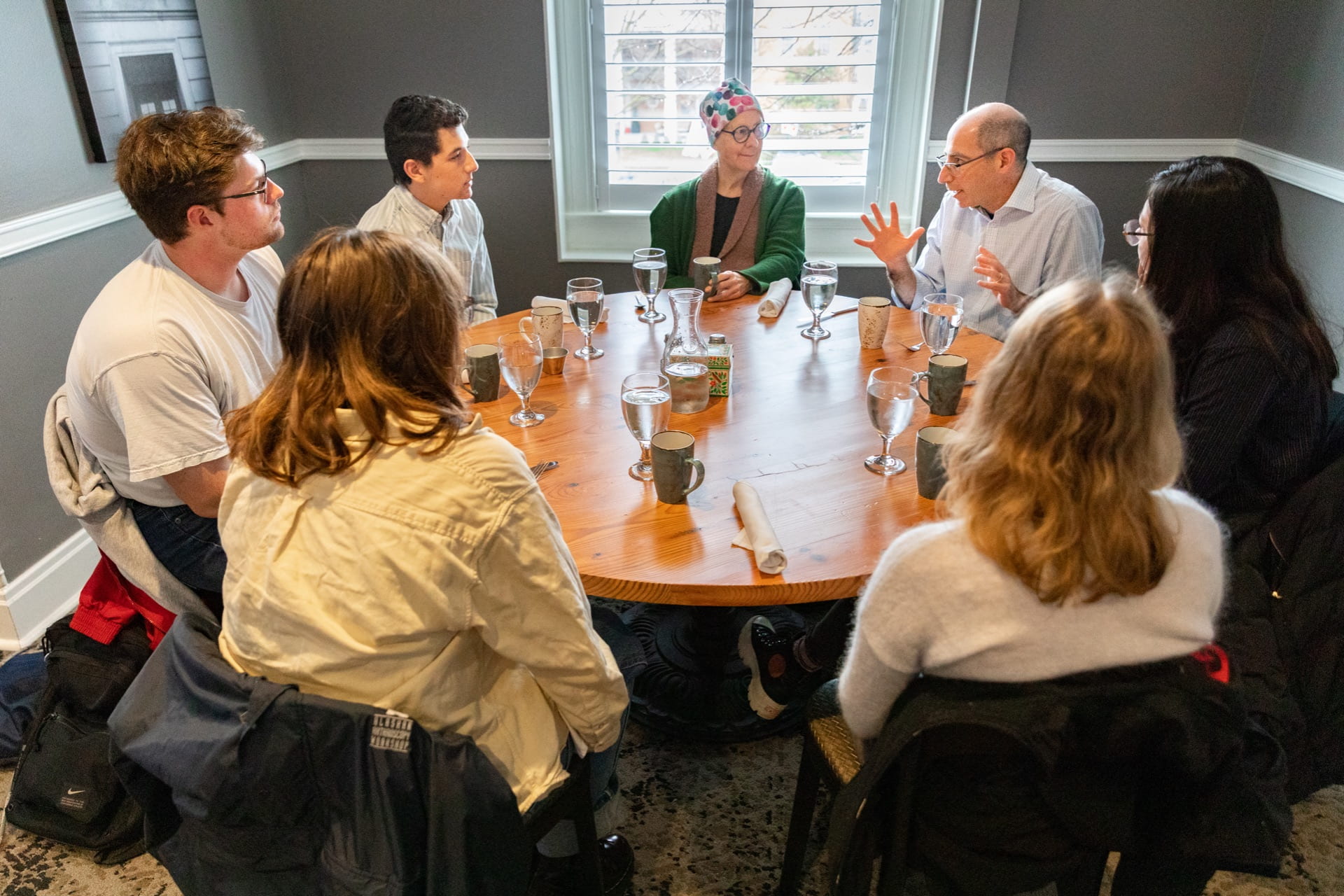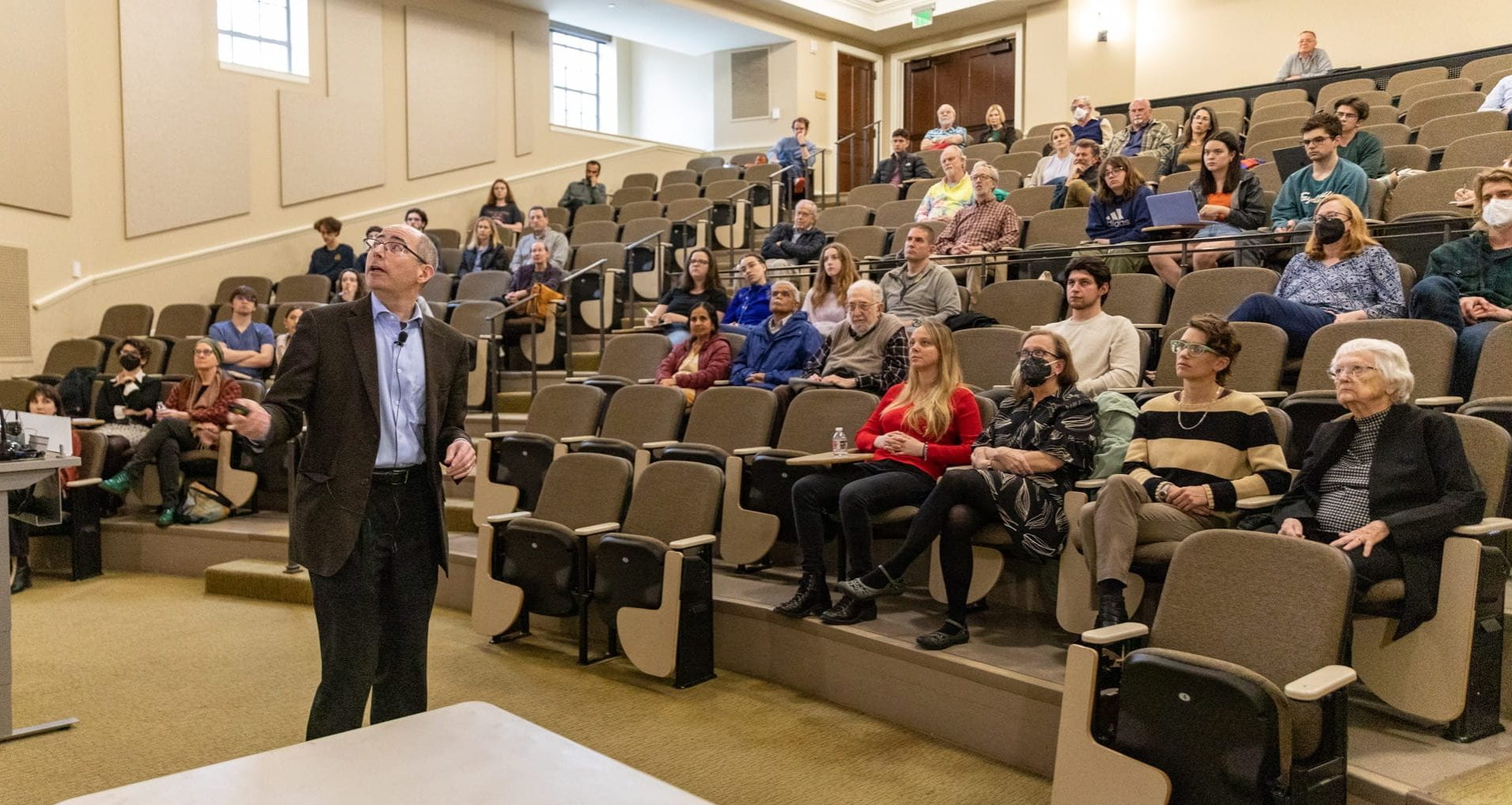David Kaiser, Germeshausen professor of the history of science and professor of physics at Massachusetts Institute of Technology, navigated the early debate among physicists and engineers on how to best incorporate relativity in the Global Positioning System (GPS). Kaiser visited the U of A campus this spring to explore those theories in a guest lecture titled “Secret Clocks.” The inaugural lecture kicks off the Palmer Hotz Endowed Lecture Series in the History of Science, hosted by the Honors College. Kaiser is the author of several award-winning books about modern physics. His most recent book, Quantum Legacies: Dispatches from an Uncertain World, was honored among the best books of the year by Physics Today and Physics World.
1. What led you to study the history of science in addition to physics?
In high school, I read lots of popular books about modern science, mostly about physics. They were wonderful, cheap paperbacks, and I could gobble them up. I enjoyed the books because they told the stories of people’s lives. Einstein and Bohr are the kinds of names I’d heard about in classes, but the books gave more of a peek into what it might have been like among the people trying to learn about the world, as well as what they found.
Then I got to college, and I was already a committed, determined physics major from the moment I walked on campus. One of the physics professors I met my first week said, “if you’re also interested in the stories of the people and the broader society, there’s a whole field of study called the history of science.” In high school, I’d never heard about this field. And so, I was a physics major, but from very early in college, I was able to work with card-carrying historians of science as well. They took me under their wing, and I wound up studying both fields as an undergraduate. I was able to delve into more detail on amazing physics stuff that I still can’t get enough of. I also began to learn that the history of science is not only about interesting personalities or heroic stories of off-the-scale thinkers. It’s part of wanting to understand what it means to be human, which often means societies, institutions, culture and politics. Why do we ask the questions that we do, or why do we ask those questions and not others? How have we tried to support the inquiry into nature and for what reasons? It is a window into a much broader set of questions. I got hooked right away.
2. What is the benefit of studying the history of science? How does it make you a better physicist?
One thing I like to note is an emphasis on the questions we ask and not always getting hung up on the answers that temporarily excite us. Many questions have a staying power that can be productive to new ideas even if the proposed ideas today might be laughable. I’m not sure I would have that same framework without having studied the history of science. There’s an understandable emphasis on the answers – who got this right first – as opposed to: when did this question become clearly formulated? When did the community get the tools to really dig in? Why did some questions disappear from interest and then come back later? The question is deep; it’s difficult, but it’s worthwhile.
The field has made me think more about why the broader society is choosing to support this work. Institutions can change, politics change, and priorities change. Where do we direct resources as a society as well as a university or department? Those are the kind of questions that fascinate me as a historian. It encourages me to talk about the amazing things in physics and cosmology with broader groups. It’s a worthy challenge; it is not easy. But I also think we rely on a broader society in many ways. It stays with me because science is done by people in the world, people in societies.
3. Your lecture “Secret Clocks” dives into disagreements between engineers and theoretical physicists on how to apply Einstein’s theory of relativity to GPS. Can you give me an example of how this scientific knowledge bears the mark of time?
There’s no disagreement on GPS today, but there was for a surprising amount of time. Why were certain questions brought to the forefront? Why was there more than one blue-ribbon panel of world-class experts who came together over a year to discuss this question and not others? There was a reason why those folks came together, and it wasn’t only because of inherent scientific interest. That brings us back to the broader world in which scientific research is embedded.
In this case, it was largely Cold War drama. The technology was predominantly for military use. Therefore, lots of people had stakes in making sure it would work as expected and designed. Some people thought: if we get it wrong, it could lead to nuclear instability, which helps make sense of why those brilliant minds were brought together in that group – at that time – to ask these questions. But it wasn’t only up to them; they were not the only relevant people to help make that decision.
4. Your book “Quantum Legacies” was recently published. What are you working on now?
I’m working on a book about the political history of gravity and Einstein’s spectacularly beautiful theory of general relativity.
In a grounded, human and messy political world, we try to tether how we’ve learned about the deeply abstract ideas of the universe, driven by World Wars, Nazis, the nuclear age, classification and fights over budgets. We’ve learned these ideas not by leaving the world but by being thoroughly embedded in it.
The invitation to deliver the Palmer Hotz Endowed Lecture Series in the History of Science was a strong catalyst to start working on this material about GPS and relativity, which I knew I wanted to write about.

Dr. Kaiser met with Honors College Dean Lynda Coon (center) and several Honors students after the lecture to discuss Physics in more detail
5. What do you think about the University of Arkansas? Has anything surprised you?
It’s my first visit, and it’s been lovely. I’ve had such fun discussions with colleagues. Just now, I was talking to one of professor Dan Kennefick’s students about her physics thesis – it was really good.
One thing that really struck me was the names of all the graduates carved into the walkways. It is a beautiful reminder of the generations. I’ve never seen something like that before. What happened in 1876 might not be in front of mind for a lot of people today, but there’s literally an unbroken line you can trace on campus.

